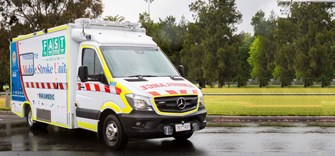What and why we advocate
-

Enhance recovery
Recovering from stroke can be a difficult experience, full of uncertainty and sometimes isolation.The Stroke Foundation stands alongside stroke survivors throughout their journey to recover. We give survivors and their families a voice. Key issues: One in three stroke survivors are of working age. 65…Read more Read lessRecovering from stroke can be a difficult experience, full of uncertainty and sometimes isolation.
The Stroke Foundation stands alongside stroke survivors throughout their journey to recover. We give survivors and their families a voice.Key issues:
- One in three stroke survivors are of working age.
- 65 percent of those living with stroke also suffer a disability that impedes their ability to carry out daily living activities unassisted.
- In 2017 there are more than 470,000 people living with the effects of stroke. This is predicted to increase to one million by 2050.
- In 2012, the total financial costs of stroke in Australia were estimated to be $5 billion (according to Deloitte Access Economics).
Stroke Foundation’s policy and advocacy focus is on:
- Improving systems to guide rehabilitation care.
- Ensuring patients are supported in what is often a long and challenging recovery journey after discharge from hospital.
- Building the profile of Australia’s stroke survivors to ensure their voice is heard loud and clear across all levels of government.
- Stroke Foundation audits show enormous variability in care between the best and the worst performing hospitals across Australia and working to reduce the gap in quality of stroke rehabilitation care is a key priority for the Stroke Foundation.
Find out more about our work here:
The Stroke Foundation supports people after stroke with a variety of tools and information including:
- StrokeLine telephone service manned by health professionals to provide practical and confidential advice.
- EnableMe online survivor support tool and community.
- Stroke recovery information.
- Translated stroke resources.
-

Prevent stroke
Stroke is one of our nation’s biggest killers and leading cause of disability. One in six people will have a stroke, and the impact is often devastating. Stroke can happen to anyone, at any time – changing lives in an instant. Stroke places significant demands…Read more Read lessStroke is one of our nation’s biggest killers and leading cause of disability. One in six people will have a stroke, and the impact is often devastating. Stroke can happen to anyone, at any time – changing lives in an instant.
Stroke places significant demands on health services, families and the community.
Preventing stroke is a key advocacy priority for the Stroke Foundation.
Challenges
- Stroke kills more women that breast cancer and more men than prostate cancer.
- Stroke is largely preventable, several of the risk factors for stroke are lifestyle related and can be controlled.
- The most important known risk factor for stroke is high blood pressure which can be managed through diet, exercise and in some cases medication.
- One in four strokes are caused by atrial fibrillation (an irregular heartbeat) which can be managed if diagnosed.
The Stroke Foundation’s policy and advocacy focus is on:
-
- Ensuring that Governments and the broader community know that stroke is preventable and take action to reduce stroke risk.
- Raising awareness of individual risk factors for stroke through Australia’s biggest blood pressure check, My Health for Life, and workplace health checks.
- Stroke Foundation’s position statement on E-cigarettes
- Australian Chronic Disease Prevention Alliance position statements on:
- nutrition labelling on restaurant menus
- alcohol supply
- alcohol and chronic disease prevention
- alcohol pricing and taxation
- marketing and promotion of alcohol
- health information and warning labels on alcohol
-

Save lives
Stroke can be treated and it can be beaten, but only if patients can access high quality stroke treatment fast. Stroke is a serious medical emergency requiring urgent medical attention, but with the right treatment at the right time, many people are able to recover…Read more Read lessStroke can be treated and it can be beaten, but only if patients can access high quality stroke treatment fast. Stroke is a serious medical emergency requiring urgent medical attention, but with the right treatment at the right time, many people are able to recover from stroke.
Challenges
- A stroke occurs in Australia every nine minutes.
- Regional Australians are 19 percent more likely to suffer a stroke than those living in metropolitan areas.
- Patient outcomes from stroke vary widely depending on where you live and your access to a stroke unit.
- Despite stroke being identified as a national priority by Australian health ministers in 1996, we are still awaiting the development of a costed national plan to close the gaps in stroke care.
The Stroke Foundation’s policy and advocacy focus is on ensuring:
- Ensuring every Australian household has someone who knows the signs of stroke and to call 000. Think F.A.S.T. act FAST.
- A nationally coordinated telemedicine network to ensure all Australians have access to ‘time is brain’ therapies.
- Ensuring all Australians have access to high quality stroke care, regardless of where they live.
- A national strategy to guide planning and a funded action plan to support resource allocation for stroke services. This will address the issues of today and challenges of the future.
Find out more about our work here:
- The Stroke Foundation is part of an innovative research project trialling a stroke ambulance
- The Stroke Foundation has developed a range of support tools for clinicians
- The National Stroke Audit collects and evaluates data on the delivery of stroke care in Australia, which in turn helps to inform our policies.
Help us create system-wide change to prevent stroke and ensure better treatment, care and quality of life for people after stroke. Advocate with us
